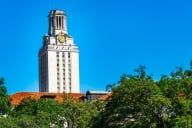You have /5 articles left.
Sign up for a free account or log in.

Getty Images
Professors earn about 15 percent less than others with advanced degrees, finds a study circulated Tuesday by the National Bureau of Economic Research.
The study (abstract available here), "Why Are Professors 'Poorly Paid'?," uses data from the Current Population Survey to compare the salaries and other characteristics of those with Ph.D., Ed.D., J.D. or M.D. degrees. Those who reported their profession as "postsecondary teacher" were compared to everyone else. The study was conducted by Daniel S. Hamermesh, an economist at Barnard College.
In his comparisons of salaries, he found essentially no differences among those at the low end of the salary scale for professors and nonprofessors with advanced degrees. The gaps grew as one went up to the more highly paid in both groups.
Hamermesh also considered (but found evidence against) the possibility that the key factor could be the relative value of a J.D. or M.D. vs. a Ph.D. He excluded advanced professional degrees and found similar gaps between doctorate holders in and out of academe.
Another key finding from the study: "Although on average professors appear poorly paid compared to other highly-educated workers, their average weekly earnings are 44 percent higher than those of workers without advanced degrees (who are of the same age and have a workweek of the same length)."
To any who might imagine that lawyers and doctors work longer hours than professors, Hamermesh uses data from the American Time Use Survey to demonstrate that this is not the case. Hours of work are similar for professors and others with advanced degrees. There is a key difference: faculty members work more on weekends and less on weekdays than do others with advanced degrees.
The American Association of University Professors has argued for years that faculty salaries -- even if some years are better than others -- are eroding, particularly in public higher education. (AAUP data on faculty salaries, searchable by institution and faculty rank, may be found on Inside Higher Ed's website here.)
Why Do Academics Pick Their Careers?
Hamermesh writes that he wanted to determine why academics select careers, given that doing so may limit their earnings compared to others with advanced degrees.
To explore the issue, he sent a survey to 1,000 academics (generally economists) who specialize in labor markets. Economics is of course an area where there are jobs outside academe, so there isn't the presumption, as in some other fields, that a faculty job is the natural path after earning a Ph.D.
"Freedom and novelty of research, and the satisfaction of working with young minds, are by far the most important attractions into academe. Only 41 percent of respondents listed time flexibility as a top-three attraction, slightly fewer than listed enjoying intellectual and social interactions with colleagues."
He adds that female academics are slightly more likely to view scheduling flexibility as a key attraction to academe than do their male colleagues, but that the gap is not significant.
The paper concludes, "I have documented a fairly large wage disadvantage of academics behind otherwise identical advanced-degree holders."








